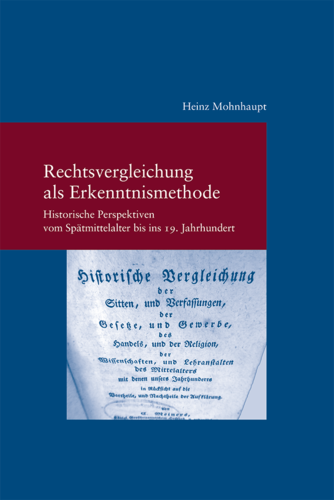Comparison is an epistemological technique with a long tradition. Under the name of "comparative studies" it affects almost all scientific disciplines today, and in jurisprudence "comparative law" has acquired a special significance. The encounter of different legal systems requires practice and science to clarify the applicability of competing bases of decision-making and the possibilities of their unification. Comparative law has always played a major role for the state, the constitution, and society in finding the best possible solutions in the competition of legal offers. The essays collected here explore the buried historical dimensions of this – often itself diachronically oriented – method of knowledge. At the same time, they examine strategies of historical comparative practice from the late Middle Ages through the early modern period to the 19th century as a cultural phenomenon of knowledge acquisition.


No comments:
Post a Comment
Note: Only a member of this blog may post a comment.